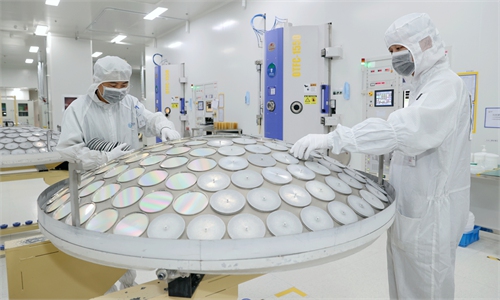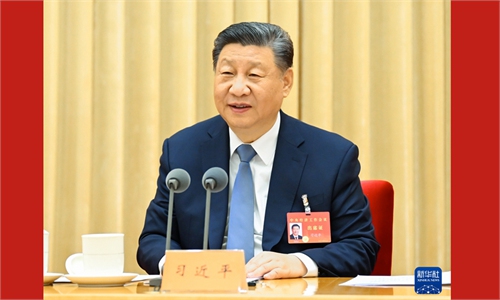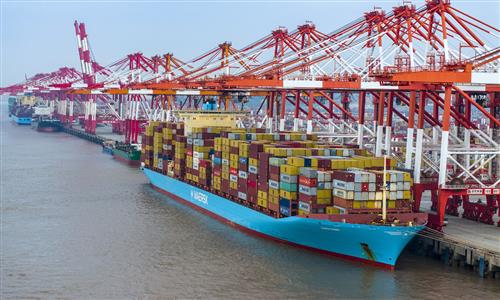Strong policies to buttress sustained economic recovery: Chinese officials
Proactive policy to exert influence on basis of this year's stance: expert

A view of the skyline of Beijing's CBD area. Photo: VCG
Officials from several ministries and departments have interpreted the spirit conveyed by the annual Central Economic Work Conference, which was held in Beijing from Wednesday to Thursday which mapped out priorities for the economic work in 2025. Officials stressed that confidence remains in China's high-quality development as the fundamentals of China's economic development have not changed, and positive factors supporting economic growth are constantly increasing.Global media outlets have paid close attention to the latest remarks from Chinese officials regarding top economic meeting of China last week. They noticed planned policy changes including monetary, fiscal and macroeconomic ones, and efforts to be made in the housing, equity and consumption markets.
Stronger policy support
China will implement more proactive and effective macroeconomic policies in 2025, which means adopting a more proactive fiscal policy and a moderately loose monetary policy, Han Wenxiu, executive deputy director of the Office of the Central Committee for Financial and Economic Affairs, said on Saturday at an annual economic conference held by the China Center for International Economic Exchanges (CCIEE), which is affiliated to the National Development and Reform Commission (NDRC).
"The specific plan will be unveiled at the national two sessions in 2025," Han said. China's annual "two sessions" is a highly anticipated event on the country's political calendar, which is usually held in March.
In general, next year's moderately loose monetary policy will exert moderate force on the basis of this year's supportive stance, Wang Xin, director general of Research Bureau under the People's Bank of China, said at the CCIEE annual conference.
According to Wang Xin, moderate force refers to the increase in overall and structural monetary policy support, cuts to the reserve requirement ratio (RRR) and interest rates in due course, and an increase in the supply of monetary credit.
The South China Morning Post reported that Chinese economic planners pledged to seek a sustainable growth rate through a number of policy changes, including a higher fiscal deficit ceiling, more treasury bonds and cuts to interest rates and the reserve requirement ratio.
Bloomberg also noted Wang Xin's remarks and highlighted in the headline that "China to cut rates and RRR next year, PBOC official says", while also noticed that fiscal deficit ratio to be widened.
Reuters also reported that China has room to further cut the RRR, with the average RRR now at 6.6 percent, citing Wang. China said this week it will raise the budget deficit, issue more debt, and loosen monetary policy to maintain a stable economic growth rate, the Reuters noted.
Implementing more proactive and effective macroeconomic policies is a forward-looking deployment that will boost domestic demand and smooth the economic cycle, thereby hedging downside risks and reducing economic volatility, Tian Xuan, vice president of the Tsinghua University PBC School of Finance, told the Global Times on Sunday.
"The combined policies will steadily defuse stock risks and allow room for new changes," Tian said.
The Ministry of Commerce (MOFCOM) will combine promoting consumption with benefiting people's livelihoods, vigorously implementing special actions to boost consumption, introducing more practical measures, and continuing to release consumption potential, Sheng Qiuping, vice minister of MOFCOM, said at the Saturday's CCIEE conference.
Outlining a number of key tasks for 2025, the Central Economic Work Conference urged efforts to vigorously boost consumption, improve investment efficiency and expand domestic demand on all fronts. Large-scale equipment upgrades and consumer goods trade-in programs should be promoted with greater intensity and scope, and active efforts should be made to develop debut economy, ice and snow economy and silver economy, according to the Xinhua News Agency.
"From what the key meeting stressed and what officials have said, China will put emphasis on the implementation of a more proactive fiscal policy, so that liquidity can enter the domestic circulation to boost investment and consumption," Yang Delong, chief economist at Shenzhen-based First Seafront Fund, told the Global Times on Sunday.
Confidence remained
"China's economy is projected to grow around 5 percent in 2024, contributing to nearly 30 percent of global growth," Han said.
Han said that China's economy has achieved remarkable progress this year, and is on track to meet its main economic and social development goals.
He noted that the employment, prices, and international balance of payments remained stable, with foreign exchange reserves staying above $3.2 trillion.
It is the first comment about China's economic prospects from a top official following the two-day Central Economic Work Conference last week, when planners looked back at 2024 and mapped out strategies for the new year, the South China Morning Post reported.
It was noted at the Central Economic Work Conference that the Chinese economy has posted generally stable performance while making progress in 2024, with solid advances made in high-quality development and major annual goals and tasks of economic and social development to be successfully accomplished, according to Xinhua.
"The fundamentals of China's economic development have not changed, favorable conditions such as large market potential and strong economic resilience have not changed, and positive factors supporting high-quality development are constantly increasing," Zhao Chenxin, deputy head of the NDRC, said at the annual CCIEE conference on Saturday.
Zhao pointed out that efforts will be made to stabilize the property and stock markets.
Dong Jianguo, vice minister of Housing and Urban-Rural Development, revealed data at the Saturday's CCIEE conference showing that market expectations in the property market have improved.
By the end of November, a total of 3.24 million housing units have been delivered, boosting buyers' confidence. Meanwhile, China has approved 3.6 trillion yuan ($495 billion) of loans in real estate projects included on the "white list," Dong said.
Starting in January, China has been pushing forward its financing "white list" mechanism for real estate projects to stabilize the market. The "white list" real estate projects could be given financing support, in order to support the financing and construction delivery of real estate projects under construction.
"The emphasis on stabilizing the property and stock markets has hit the nail on the head. The policies are expected to boost consumer confidence and spur investment growth, so as to truly stimulate domestic demand and stabilize economic growth," Yang said.
While acknowledging the deepened adverse impact brought about by changes in the external environment and many difficulties and challenges still facing the domestic economic operation at present, the meeting pointed out that the supporting conditions and fundamental trend for the Chinese economy's long-term sound development remain unchanged, according to Xinhua.
Zhao also mentioned that the external environment is becoming more complex and grimmer. Domestic demand is insufficient, some enterprises have difficulties in production and operation, and employment and income are under pressure.



